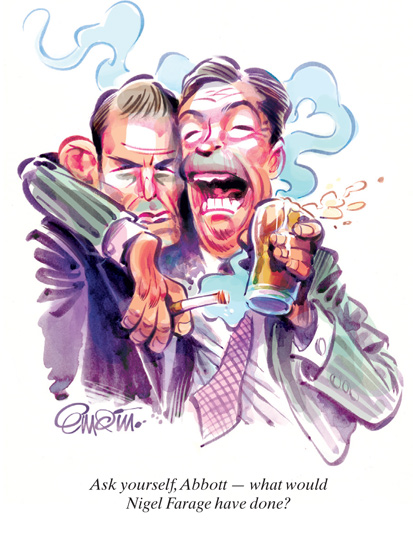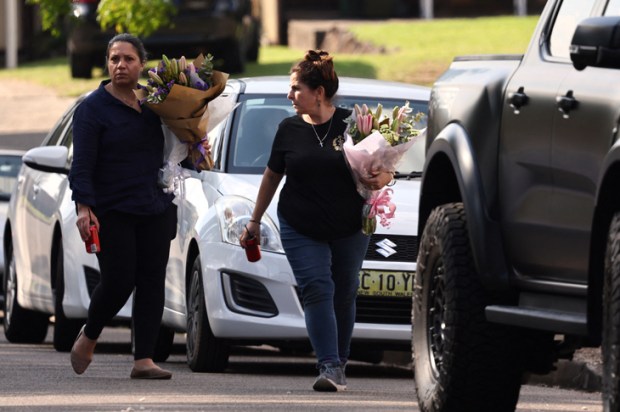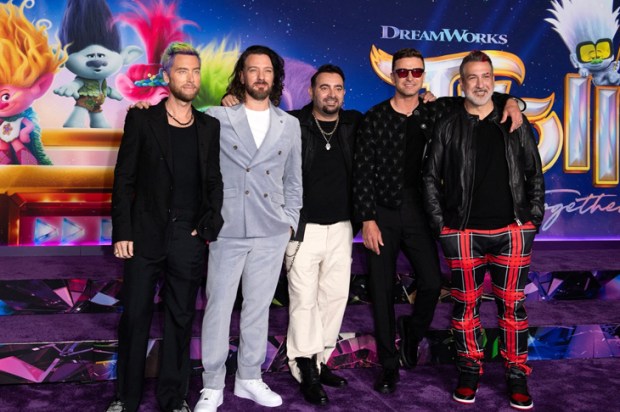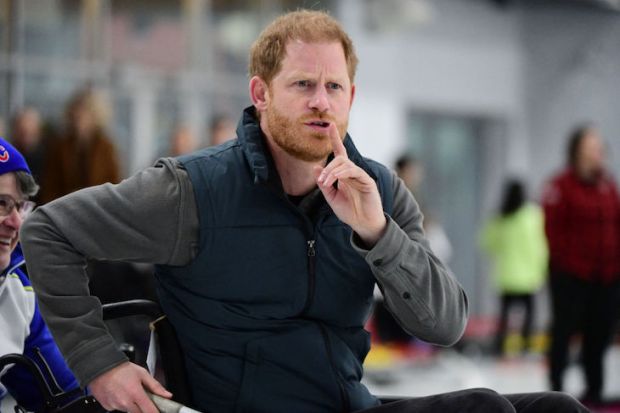Tony Abbott was made to look a fool again by the left-liberal media the other day. This time — where else? — on the ABC’s Jon Faine show, when a 67-year-old grandmother called in to blame Abbott for the fact she could only make ends meet by working part-time on phone sex chat lines.
So how should Abbott have responded? Certainly not in the awkward way he did with a halting, typical bloody politician’s reply and a self-conscious, theatrical wink which made him look like the heartless, two-faced, cynical bastard I’m quite sure he isn’t. Instead he should have first paused a while and silently asked himself a simple question: ‘What would Nigel Farage do?’
Nigel Farage, as you can hardly be unaware thanks to his UK Independence Party’s spectacular recent landslide in the European elections, is probably the most charismatic and successful operator in British politics. What Farage lacks in power (neither he nor anyone else in Ukip has a seat in Westminster, only in the joke European Parliament in Brussels), he more than makes up for in popularity with the man (and woman) in the street. This is a quality Abbott could do well to emulate.
So how would Farage have responded to that grandmother googly? Would he have deflected it with a cautious block or whacked it thrillingly into the outfield? Hard to say exactly, for Farage is unpredictable and his risks don’t always pay off. In the run-up to the Euro elections, for example, he made the near-fatal mistake of suggesting, in a hostile Faine-style radio interview, that most people would not like it very much if a family of Romanians moved in next door. He subsequently had to apologise.
But I think what he might have done is something akin to what he did during last year’s local council elections when it emerged that one of his candidates ran Northampton’s premier lapdancing club. Instead of acting coy and apologetic — as was no doubt expected of him — Farage gave vent to his Thatcherite instincts by hailing the candidate as just the kind of successful entrepreneur who was bringing money and jobs to the local economy.
Perhaps, on similar lines, Farage might have congratulated that grandmother on her entrepreneurial spirit. Instead of sitting around on her bum all day expecting the taxpayer to bankroll her every problem, here she was — 67 but still clearly very feisty — finding her niche in a growth industry which enabled her to work comfortably from home, earn useful money and make the most of her impressive imagination and interpersonal skills.
Can you imagine the fury from the shrill, po-faced Left if Abbott had come up with a response like that? But can you not also see what wonders it would have worked for Abbott’s reputation with the rest of Australia? At last — a conviction politician who tells it like it is, not some mealy-mouthed careerist who daren’t ever say anything either interesting or honest for fear that someone, somewhere might be offended.
It’s a technique that has worked for Farage. If you can call it a technique. David Cameron thinks it is. Just this week the British PM said of Farage: ‘He is a consummate politician… So I don’t really accept that he’s a normal bloke down the pub.’ But that’s just the sour grapes of a man whose party has been beaten into third place by a bunch of upstarts. And also the jealousy of a politician often viewed as cold, remote and snooty towards a rival with a quality he’d dearly love to possess but surely never will: authenticity.
Authenticity is Farage’s deadliest weapon — as it is also of Mayor of London (and another of Cameron’s most dangerous political rivals) Boris Johnson. The reason it’s so effective, perhaps now more than ever, is that it’s the one quality capable of penetrating the wall of public apathy towards the political class. As the recent election results showed, people across Europe are sick to death of hearing the same old platitudes from politicians who, no matter what mainstream party they represent, appear utterly oblivious to the needs and concerns of the voters they supposedly represent.
Farage is most definitely not like every other ruddy politician. His natural response on encountering trouble — a bunch of left-wing politics students who accost him in pub; a Conservative rival who tries to trip him up on the election trail — is not to run away but to set the controls for the heart of the sun and engage in the honest, open debate he so relishes.This is what makes him such a breath of fresh air to the jaded electorate. As far as ordinary working people are concerned he’s one of them. He likes a pint; he smokes like a chimney; and he speaks his mind.
No one is expecting a health nut like Tony Abbott to take up smoking to prove how ‘real’ he is. But he could certainly take a leaf out of Farage’s book when it comes to making the most of his hinterland. He’s a fighter (with two Oxford boxing blues to prove it); he’s a man of genuine moral principle (the early career as a seminarian); he’s brave and not afraid to get down and dirty (his volunteer work as a fireman). Yet little of this really comes across in his encounters with the media and public. Instead — a common problem for conservatives in a relentlessly hostile world — he still seems somewhat shifty and apologetic and cautious.
I’m a great admirer of Abbott. Among the leaders of the free world he’s one of the best representatives for the cause of smaller government and freer markets we’ve got right now. There’s not much wrong with his policies. The problem lies in the presentation. And if he wants to do better, maybe he should do a reverse David Cameron (currently being advised, of course, by Australia’s Lynton Crosby) and go to Britain for some advice. What he needs is the Farage touch.
Got something to add? Join the discussion and comment below.
You might disagree with half of it, but you’ll enjoy reading all of it. Try your first month for free, then just $2 a week for the remainder of your first year.















Comments
Don't miss out
Join the conversation with other Spectator Australia readers. Subscribe to leave a comment.
SUBSCRIBEAlready a subscriber? Log in